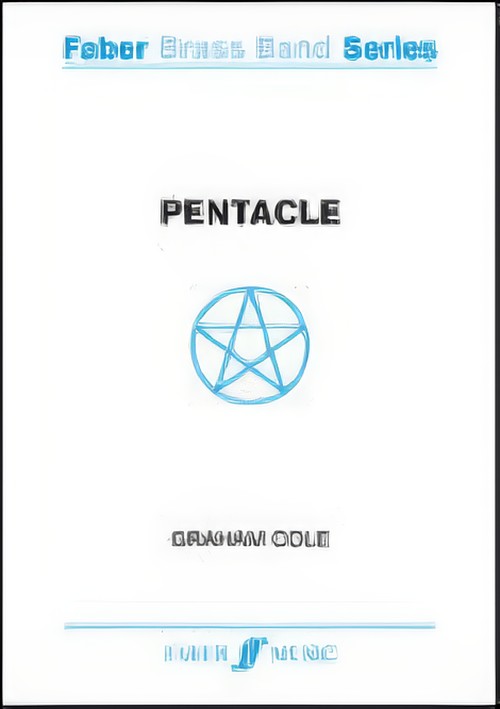Results
-
 £29.95
£29.95PAGEANTRY (Suite) (Brass Band - Extra Score) - Howells, Herbert
Extra Score only. National Championships of Great Britain Area Test piece 2017 - Championship Section. Recorded on Polyphonic QPRL040D Pageantry
Estimated dispatch 7-14 working days
-
 £59.95
£59.95PAGEANTRY (Suite) (Brass Band Set - Score and Parts) - Howells, Herbert
Score & Parts. National Championships of Great Britain Area Test piece 2017 - Championship Section. Recorded on Polyphonic QPRL040D Pageantry
Estimated dispatch 7-14 working days
-
 £85.00
£85.00PENTACLE (Brass Band - Score and Parts) - Cole, Graham
2009 National Championships Area Qualitying Contest - 1st Section.It is a five-movement work, played without a break. The Pentacle is an image of an up-right five-pointed star drawn inside a circle with a single continuous line making the five points equally spaced. Traditionally, each of the five angles has been attributed to the five metaphysical elements of the ancients. These provide the titles for the five sections of he piece: Earth (representing stability and physical endurance), Wind (representing intelligence and the arts), Fire (representing courage and daring), Water (representing emotions and intution) and Quintessence (which represents the All and the Divine spirit).Duration: 13.00
Estimated dispatch 7-14 working days
-
 £30.00
£30.00PENTACLE (Brass Band - Score only) - Cole, Graham
2009 National Championships Area Qualitying Contest - 1st Section.It is a five-movement work, played without a break. The Pentacle is an image of an up-right five-pointed star drawn inside a circle with a single continuous line making the five points equally spaced. Traditionally, each of the five angles has been attributed to the five metaphysical elements of the ancients. These provide the titles for the five sections of he piece: Earth (representing stability and physical endurance), Wind (representing intelligence and the arts), Fire (representing courage and daring), Water (representing emotions and intution) and Quintessence (which represents the All and the Divine spirit).
Estimated dispatch 7-14 working days
-
 £55.00
£55.00PRELUDE & JUBILATE (Brass Band Set - Score and Parts) - Barry, Darrol
2007 National Championships Area Qualitying Contest - 3rd Section.
Estimated dispatch 7-14 working days
-
 £29.95
£29.95RHAPSODY IN BRASS (Brass Band Extra Score) - Goffin, Dean
Extra Score only. National Brass Band Championships of Great Britain Area Test Piece 2017 - Second Section. The Movements are as follows :01. Allegro giocoso02. Andante con moto03. Allegro assai e giocosoDuration: 9:30
Estimated dispatch 7-14 working days
-
 £59.95
£59.95RHAPSODY IN BRASS (Brass Band Set - Score and Parts) - Goffin, Dean
Brass Band Set and Score. National Brass Band Championships of Great Britain Area Test Piece 2017 - Second Section. The Movements are as follows :01. Allegro giocoso02. Andante con moto03. Allegro assai e giocosoDuration: 9:30
Estimated dispatch 7-14 working days
-
 £74.95
£74.95SINFONIETTA - The Wayfarer (Ball) (Brass Band - Score and Parts) - Ball, Eric
2007 National Championships Area Qualitying Contest - 1st Section.
Estimated dispatch 7-14 working days
-
 £37.95
£37.95SINFONIETTA - The Wayfarer (Ball) (Brass Band - Score only) - Ball, Eric
2007 National Championships Area Qualitying Contest - 1st Section.
Estimated dispatch 7-14 working days
-
 £25.00
£25.00ST ANDREW'S VARIATIONS (Brass Band Extra Score) - Fernie, Alan
Brass Band Extra Score only. National Brass Band Championships of Great Britain Area Test Piece 2017 - Fourth Section. French Open Championships 2007. Contains:Theme - AndanteVariation 1 - Alla MarciaVariation 2 - GentlyVariation 3 - AdagiettoVariation 4 - Alla Marcia - sempre marcatoVariation 5 - AndantinoVariation 6 - Con Moto sempre rubatoVariation 7 - AllegrettoVariation 8 - Lento moderatoFinale - Allegro giocoso
Estimated dispatch 7-14 working days
